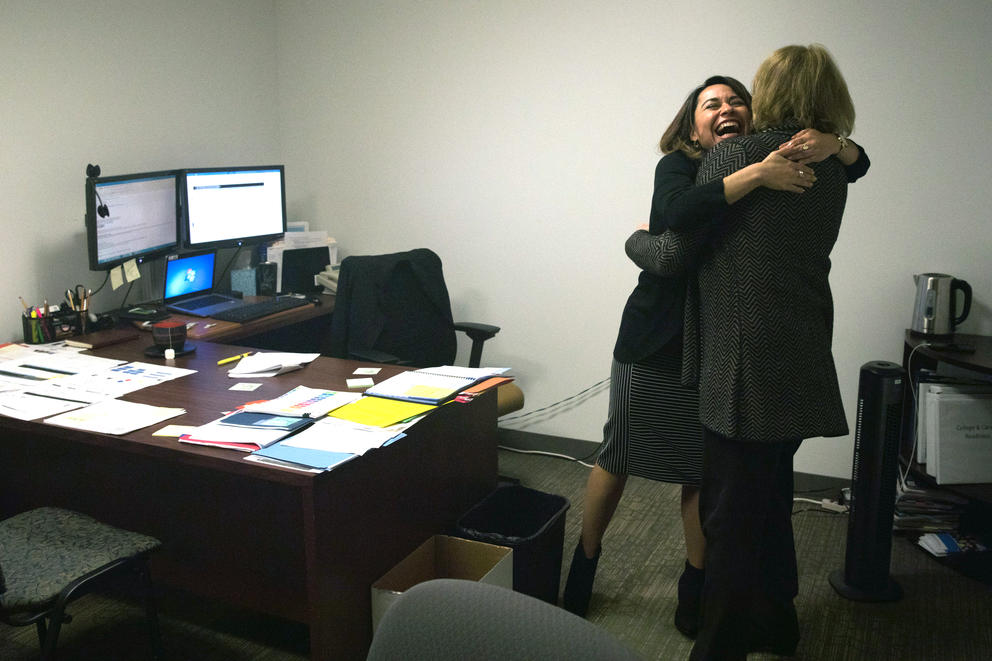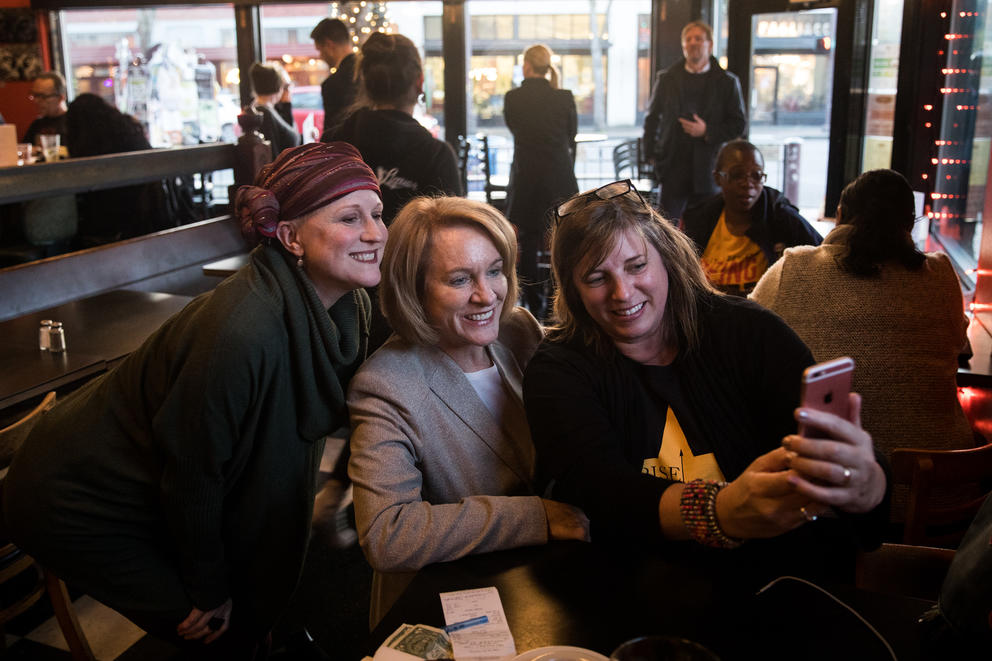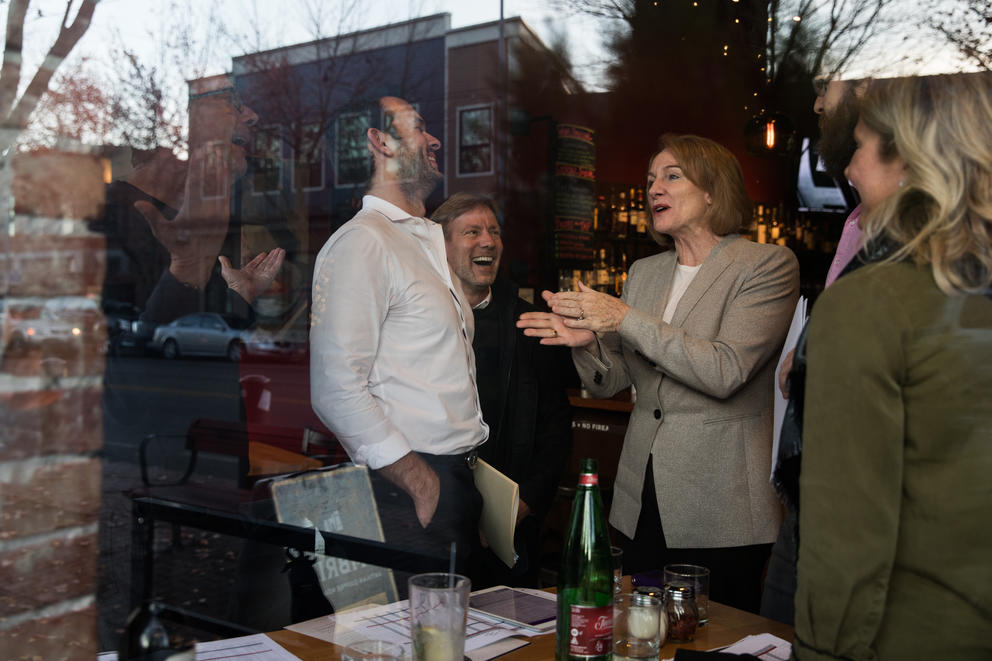The mayor chose to spurn those trappings that come with her office on this October afternoon.
The topic was policing in Seattle, after all, and Jenny Durkan knows policing in Seattle: She was U.S. attorney for the Western District of Washington for five years, during which time she brought this case against the city. It was that old job — and perhaps her handling of this particular case — that got her new job. Several years and one election later, she had joined the other side, arguing that the city has done enough in implementing reforms.
Has there ever been such symmetry, she wondered during an interview in her City Hall recently? Doubtful. But how could she pass this up? No matter the optics of a political figure assuming the role of a litigator, this was her case — the only one she’d personally argued as U.S. attorney and now one she would personally argue as mayor.
"If she stands up, I can ask her questions," the Bush-appointed judge warned her staff.
She stood, comfortable behind the podium — maybe even more comfortable there than at her City Hall podium. "Thank you, your honor," she said. Then the mayor of Seattle spoke for 12 minutes about policing in her city.
A year in office, Durkan is reckoning with the same forces that propelled her there in the first place. On the campaign trail, as the city watched its former mayor resign amid sexual abuse allegations, Durkan had cast herself as the candidate who would bring stability. She was late to calling for Ed Murray’s resignation — even accepting his endorsement — but the promise of a steady hand gave her a landslide victory.
In the wake of what one mayor’s office staffer called the “Wild West” of City Hall, Durkan's approach so far has been to swing the pendulum toward a deeply hands-on style of governing. She visits city departments weekly, she sits in on technical briefings with reporters, she demands constant updates from her staff, and, yes, she will argue a case in court if she feels it’s best. All outward communications from each department are routed through her office. Staff members say Durkan handwrote most of the city's new gun-storage law, which passed in early September, because she felt she was best-qualified to shape the law to survive an National Rifle Association lawsuit. It worked.
And where she can’t be, she deploys her deputy mayors as extensions of her office as sentinels who constantly report back to her.
"When her deputy mayors say jump, everybody jumps," said one senior department official.
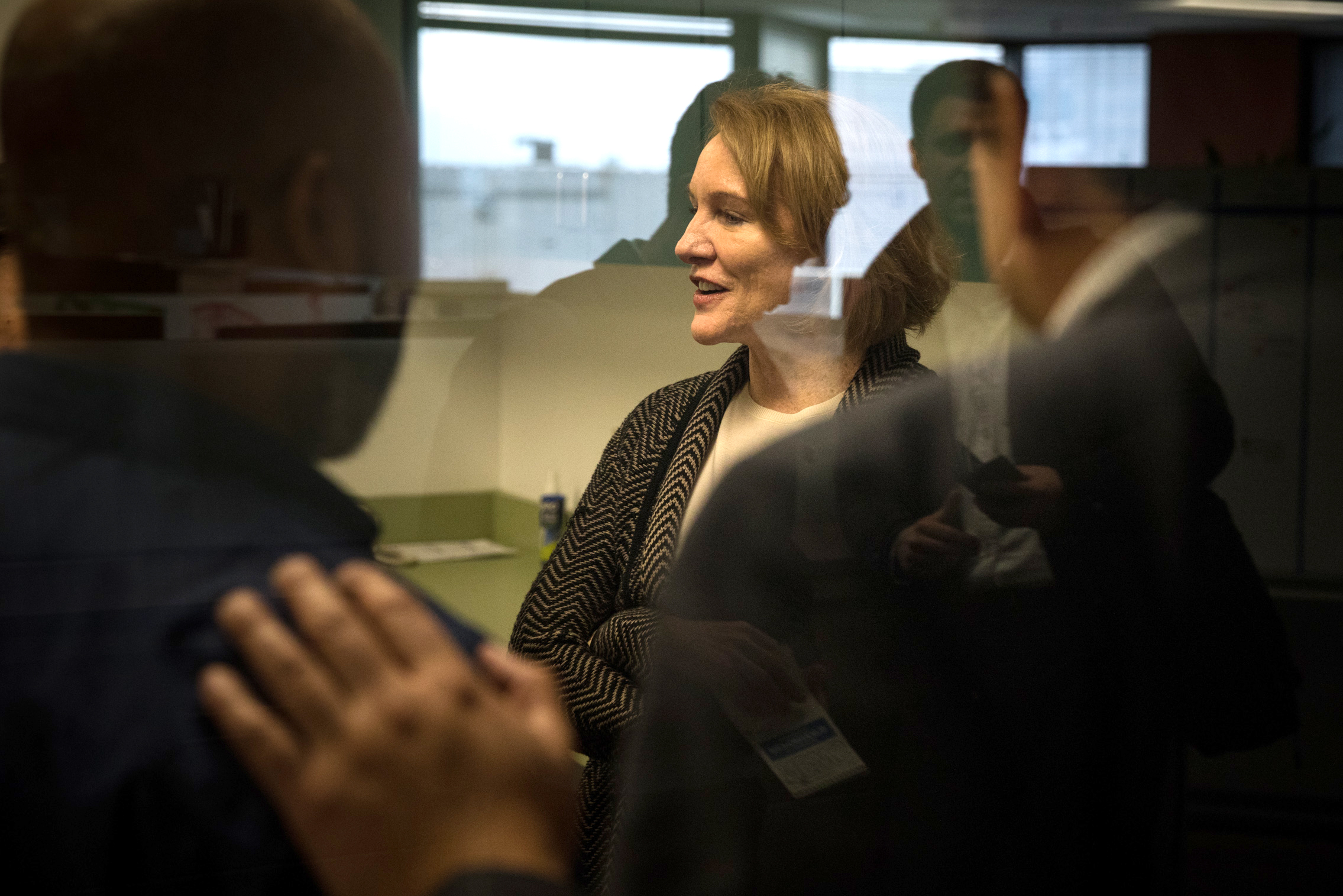
With the chaos of Ed Murray’s final days receding into the rearview mirror, the city has turned away from palace intrigue and toward the tents, the cost of housing, the traffic.
The question, though, is at a time when affordability and homelessness are at crisis levels, traffic worsens and climate change looms, can Durkan avoid getting lost in the rabbit hole of managing government and provide a vision for a city teetering on — and, for some, tumbling over — the edge of affordability and livability?
Crosscut set out to answer this question by reviewing the mayor’s first year in office. In addition to interviews with the mayor and her staff, we talked to more than 15 different people inside and outside City Hall, most of whom agreed to be named, as well as several city staffers from City Light, transportation, human resources and the legislative department, who spoke on the condition they not be named to speak openly about their boss, the mayor. The reviews were mixed.
Her closest supporters are emphatic in their support for the mayor. They point to the education levy that city voters passed earlier this month as a major accomplishment. There are others: the safe-storage gun legislation, a new police contract, added shelter beds, vacated marijuana convictions. After a period of chaos, backers of Durkan say she's assembled an impressive list of accomplishments. Any slowness — like, say, her seemingly casual pace in appointing department heads — is due to a deliberate approach, they say.
As if anticipating critiques about her office's sense of urgency, the mayor released a report titled "One Year of Urgent Action."
"There were things about her campaign and her candidacy that were really exciting for me and helped motivate me to fight for her and I feel like she's delivered," said Nicole Grant, executive secretary-treasurer of the Martin Luther King, Jr. County Labor Council.
Others, though, are less sure. Some council members complain about what they view as the slow pace at which legislation from the seventh floor is crafted. Her office is seen as relentless in the pursuit of its goals, an occasionally off-putting approach. Other voices in the community crave a sweeping and aggressive plan for housing and transportation that is arriving too slowly and a budget that takes more than incremental steps toward adding more housing.
Her approach so far, said council candidate and activist Shaun Scott, “doesn't fit the rhetoric from her that we're in a state of emergency” on homelessness.
It's early yet for the mayor. "Every person needs about 18 months to get your bearings," said Marilyn Strickland, CEO of the Seattle Metropolitan Chamber of Commerce, herself the onetime mayor of Tacoma.
But can Seattle wait?
Running a city
Shortly after the Obama administration appointed Durkan to become the country’s first openly gay U.S. attorney in 2009, she received some unsolicited advice about the office from her predecessor, who had just been fired.
"His comment to me was, 'Look, the place runs itself. You don't have to do anything,' " Durkan recalled recently, as she was being shuttled between appearances in her city-issued hybrid SUV. She recoiled from that advice. "My observation in an organization, small or big: Somebody is always running it. There are always some ideals that are driving people and so if it's not intentional, you don't end up in the place that people may think they want to."
If there's a unifying theory to the Durkan administration, it's that she largely rejects anything she views as a quick-fix effort that could be vulnerable to future sea changes, be they political, financial or otherwise — what she calls "Raccoon Syndrome, where you get distracted by the shiny objects."
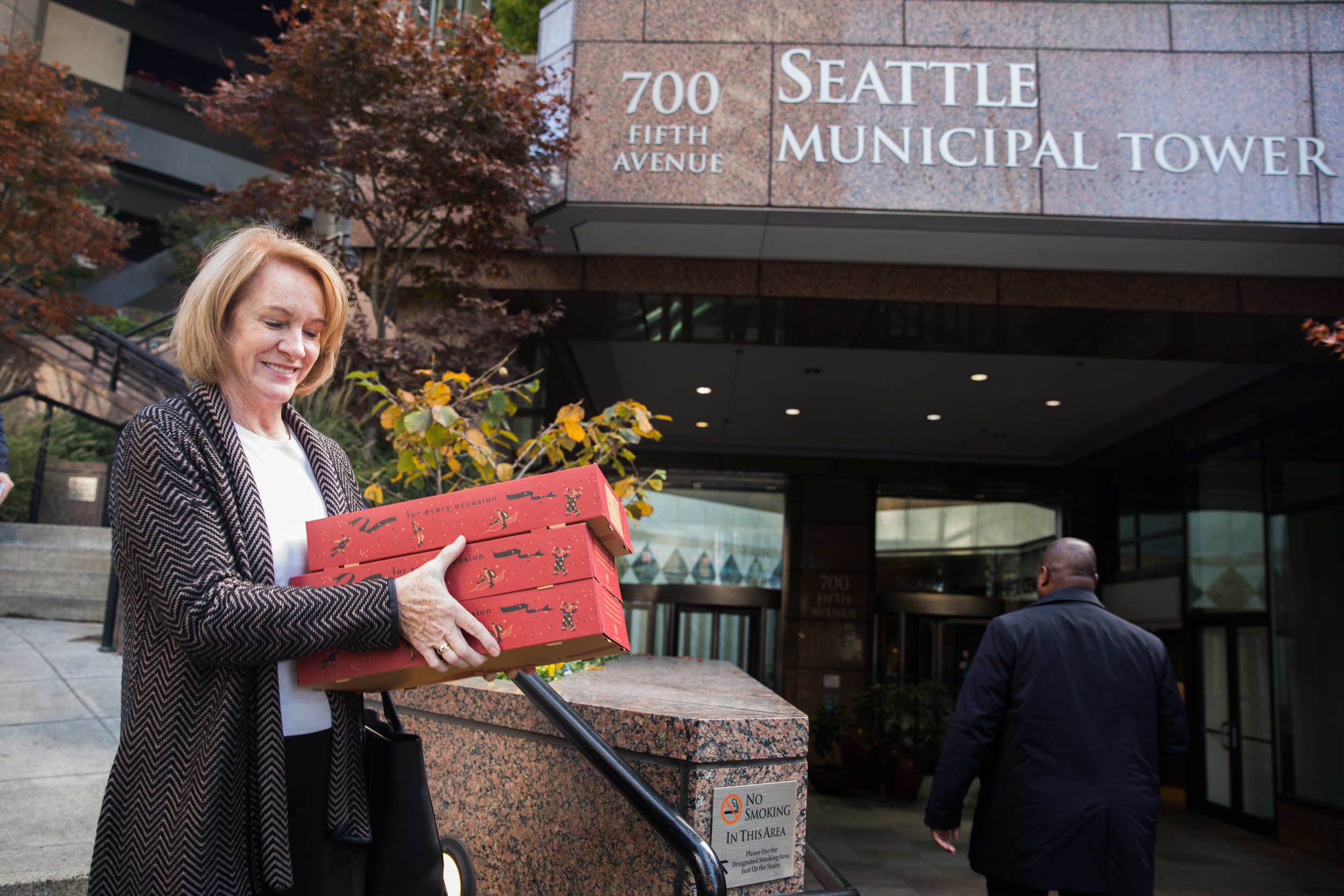
On homelessness: Fixes must be coordinated with the state and county. On policing: Federal oversight will make long-term changes permanent. On utilities: She demands weekly reports on Seattle City Light’s improvements, hammering on the motto, "That which gets measured gets managed."
"My belief is to make long-term systemic changes, you've got to change the systems," she said. "Mayors come and go, but systems stay in place."
But systemic changes take time and the problems are immediate. She must cope with hundreds of pages of briefings from each department, each listing issues in need of a decision, while simultaneously pursuing her preferred collaborative approaches to homelessness and transportation.
It may have taken a few months for the scope of the job to sink in. Councilmember Lisa Herbold, who’s worked with seven mayors as a council member or legislative aide, said that, several months into Durkan’s tenure, “it seemed like there was this, 'Oh wow' moment, where everything just started slowing down. I think there was a realization of how much was happening that she maybe didn't quite have a handle on and maybe some of those were things she didn't want to happen."
“She likes to refer to herself as the impatient mayor,” added Herbold. “When it comes to getting expected legislation, that's not our experience.”
At the same time, Herbold said she respects the times Durkan has shown herself willing to change course. While Durkan got heavy backlash for first excluding, then nominating Carmen Best to be the chief of the Seattle Police Department, Herbold said she felt Durkan “listened and heard” the community and course-corrected.
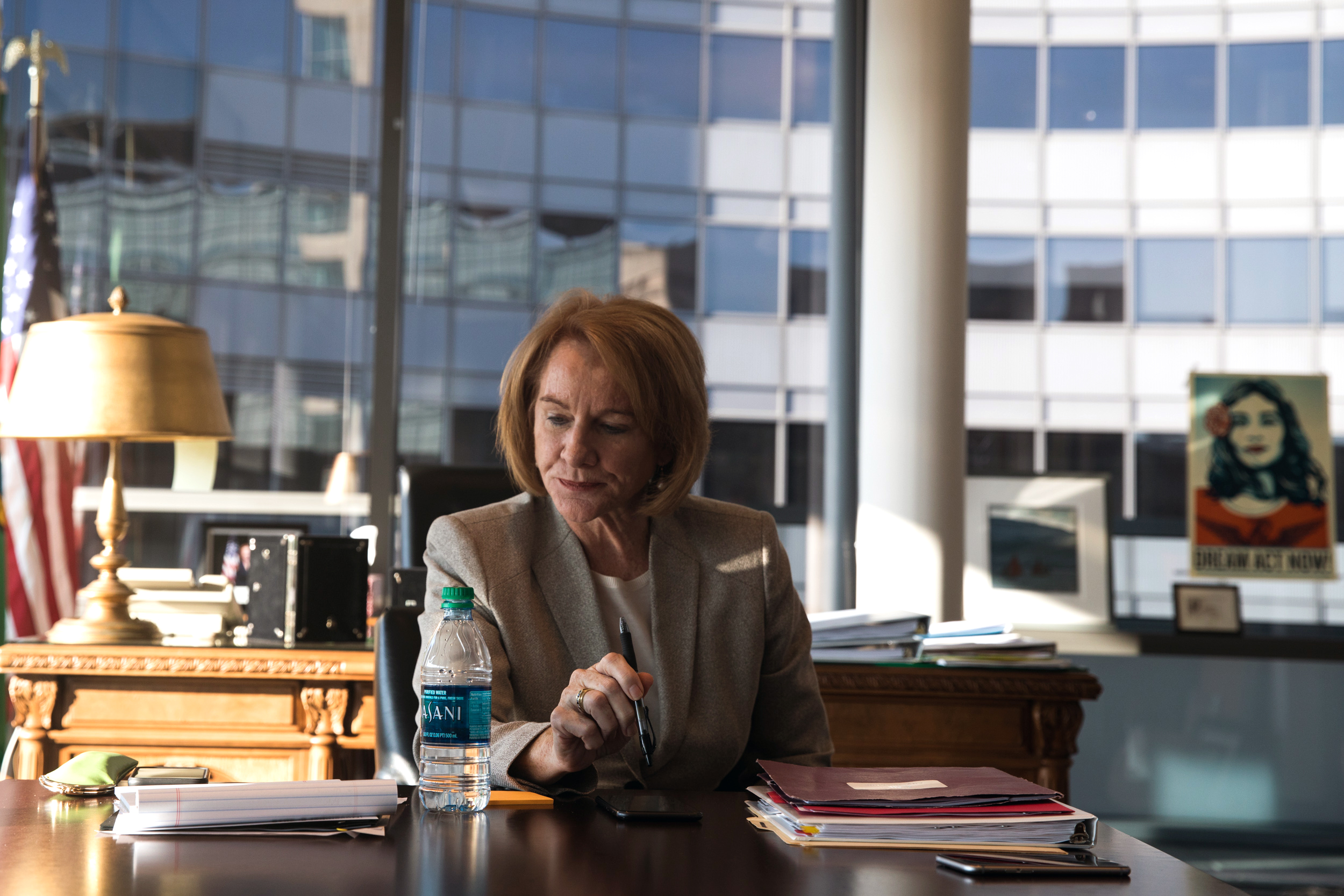
Most observers, including Herbold, recognize that it's early and the scope of issues Durkan is facing is significant. But that latitude has a shelf life of only so long. Why don't the departments of transportation, human services, parks, information technology and civil rights have a permanent leader yet? What's the Big Idea for homelessness? Are we building a streetcar system or not?
On big ticket items like the scaled-back Move Seattle levy, the problems predate Durkan. But that blame is starting to shift her way, especially as the Seattle Department of Transportation still does not have a permanent director.
“From our vantage point it looks like that uncertainty within SDOT has contributed to a lack of vision and ability to deliver transit projects on time,” said Katie Wilson with the Transit Riders Union.
As the clock ticks, however, Durkan always answers the same way: "I hear from everyone they'd rather have things done right."
A matter of communication
As mayor, the world around Durkan bends toward her — a gravitational pull that comes with being recognizable to a lot of people. On some levels, she seems to enjoy it, delighting in the look on the cashier's face as she orders three dozen doughnuts for her staff from Top Pot.
At every stop, people tell her things and she gamely receives them. A woman outside Seattle's Municipal Tower tells how hard it is to find daycare in the city. The owner of a knick-knack store in Columbia City urges her to examine the city's tax structure. Another man has something to say about the bike routes from South Seattle to downtown.
People generally want to talk about things highly specific to their own experience in the city, say staff: drain pipes or street conditions or their local park. And as they do, Durkan is validating. With the woman who stops her to talk about daycare, Durkan looks her directly in the eyes and nods while still holding the doughnuts she just bought.
On another level, though, Durkan swears she's an introvert. She misses her privacy and says that the attention is hard on her family. Unlike with past mayors, her home address is fiercely guarded — fallout from the murder of Thomas Wales, an assistant U.S. attorney who worked in Seattle.
At dinner out, people often approach the whole family, even sitting at their table. Looking toward Elliott Bay from her office, Durkan jokingly fantasized about being a tugboat driver — a job in which "no one talks to you and it's awesome."
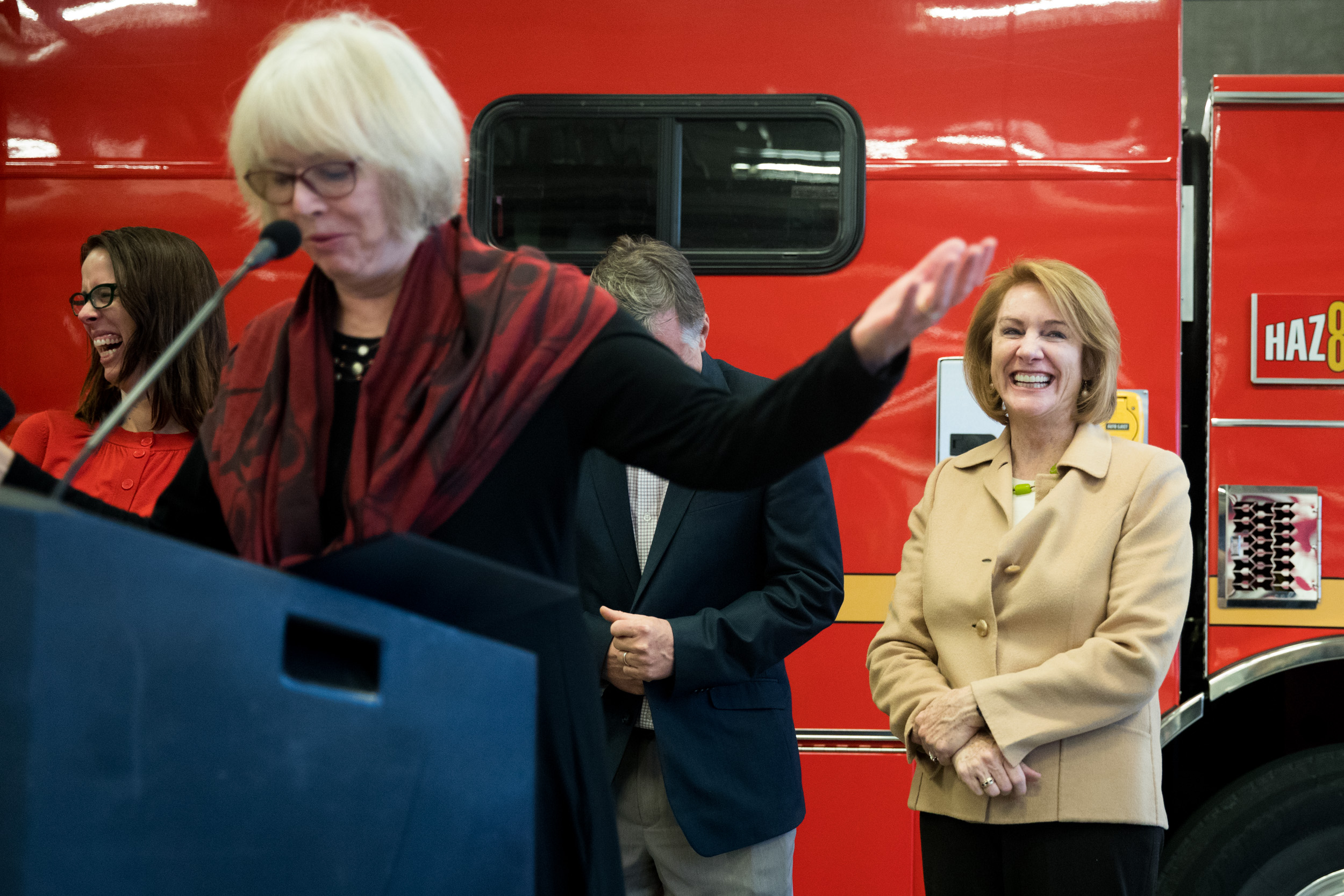
Although she's demanding of her staff — abandon hope all ye who enter her office unprepared — they nevertheless maintain a cultlike reverence for her, ever eager to tell you about her latest quirky maneuver. One example: Department heads who bring bad news get T-shirts that say, "I've got your back." Where a full majority of the more than 40 staff in Murray's office flipped in his first 18 months in office, Durkan so far has had just two employees leave — one to attend Harvard, the other to head the Department of Neighborhoods.
Outside of her office, though, appraisals of her communication are a mixed bag. Some are good: One observer of the selection process for the new City Light CEO called it "the most inclusive process I've ever seen." One city employee who has attended large-ish meetings with mayors in the past two administrations noted that more women were sitting at the table. She’s praised for showing an interest in the workings of the departments.
"I feel like she's a person of her word, which is not normal for a lot of politicians," said one longtime employee in the transportation department. "She's definitely stepped up to deal with the harassment and discrimination behavior in SDOT."
Among council members, longtime friend and ally Sally Bagshaw has predictably good things to say. "I think she's a natural at this job," said Bagshaw, who announced earlier this week that she will be leaving the council. "Of course people can always criticize and say, 'Oh, she should be doing so much more.' That's true. She should be doing so much more. But can she as one human being? I don't think so."
Others in the council's second floor offices describe an aggressive legislating style from Durkan's office, which one person compared to that of a litigator. She fights hard against adjustments to her proposals. For example: In the days leading up to the council's vote on the new police contract, Durkan joined Chief Carmen Best in a tour of West Seattle, the heart of the district represented by Herbold district, who at the time was on the fence about her vote. When asked if that was an intentional pressure campaign, members of her staff give a wink and a nod.
"Let’s just say that I think more than one of our scheduled monthly meetings have started with a hug and mutual agreement that whatever happened at the previous meeting must have something to do with our red hair," said Herbold.
Durkan does not deny that she can drive a hard bargain, but couches it as an antidote to the more deliberative Seattle process. "I think I'm pretty direct on, 'Here are the things that for me are negotiable, here are the things that are not negotiable, and here are the things that I think I need your advice on.' "
Outside of City Hall, some community groups feel they can't get through to Durkan. This appears to be especially true among housing and transportation advocates, who would like the mayor to act more aggressively to add alternatives to cars and to increase the housing supply.
"I would say that a lot of organizations that I've spoken with have had the experience that it's been very hard to establish a relationship with her office," said Wilson with the Transit Riders Union. "I think a lot of folks that I know who work in everything from transportation to housing to homelessness are feeling like it's not clear who she's listening to, because it's certainly not us."
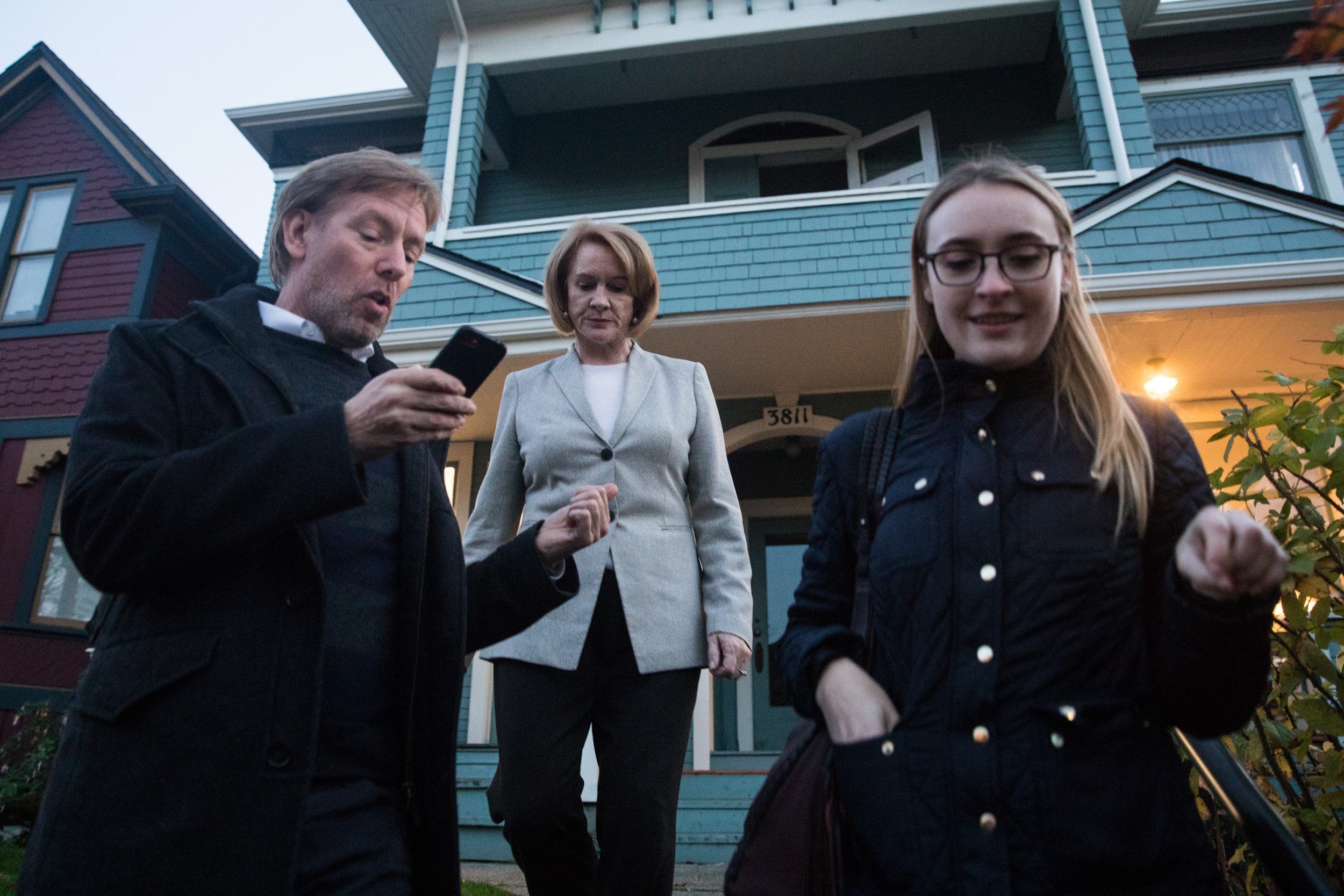
What comes after the head tax?
From the beginning of her tenure, Durkan had to deal with the so-called head tax — what Deputy Mayor Mike Fong called "a gaping conversation left to be had into January, February, March, April" of her first year.
Durkan opposed the tax from the campaign trail and tried mightily to ignore it when she took office. When she finally engaged to cut a smaller deal, she says she believed everyone was satisfied, including the business community, and that that was the end of the conversation.
She was mistaken.
"There were a lot of other business folks who I believed to be at the table and we had an agreement that, while they didn't like it, we were going to move on," she said. "But obviously that was not shared up and down the chain of the various businesses."
Practically the entire business community, including Amazon, with which Durkan believed she had made a deal, immediately turned against it. A successful campaign from opponents to put the tax to voters spooked the council into repealing it just a month after it passed.
The tax's repeal has left an empty space. Love it or hate it, it was a significant proposal to ease the homelessness crisis by funding the addition of more housing. The mayor has since shored up funding for more shelter beds, but people are wondering what's next.
"We don’t yet have the replacement strategy for the severe revenue shortage we face," Councilmember Teresa Mosqueda told Crosscut just before the council approved the city’s budget earlier this month. That should be the priority for 2019, she said, "otherwise all of our commitments, the mayor's included, are going to continue to be on the to do list."
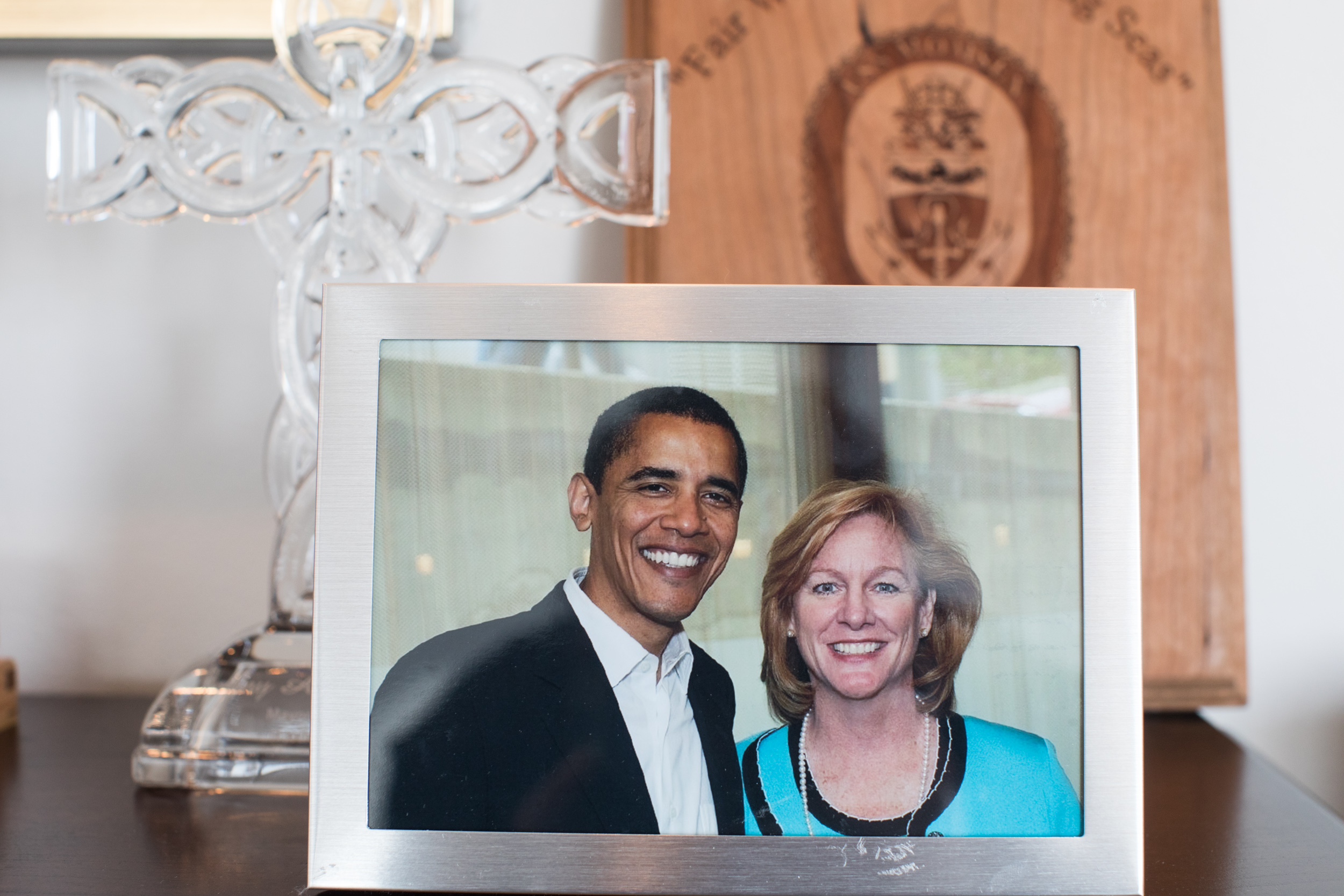
It's here that the mayor's insistence on building solutions around permanent systems clashes with the belief that the city needs to charge ahead with immediate action building more housing. Durkan has prioritized immediate shelter, but she and her staff mostly refuse to talk about long-term solutions that do not involve more participation from the state. In fact, Durkan says she believes it was a mistake for the city and county to declare a state of emergency around homelessness, as it did in 2015, because it gives the impression there's a responsive fix, comparable to how the Federal Emergency Management Agency might swoop in after a natural disaster.
"Bottom line, we can't solve homelessness without solving poverty," she said.
From a broad view, few disagree with this sentiment.
And yet, there's real fatigue around Durkan’s "regional solutions" line. Members of her staff say the mayor will be the one to finally make that a reality. But they're competing with a growing fatalism: After years of talk, it hasn't happened.
“We can't wait for that,” says Wilson. “We need to be doing every single thing we can in Seattle to be raising progressive revenue.”
The activist community in particular has been quick to remind Durkan and her allies that people are dying in the streets.
"We had real concerns about what Mayor Durkan would do to alleviate the situation with homelessness and what she would do to construct as much housing as possible," said Scott, the activist and council candidate, who wants the city to use its bonding capacity to build more affordable housing. "I think on those fronts there's a lot to criticize."
Scott was never a Durkan fan, to be sure, and says she has failed to surprise him in a positive way. "I think if we've seen direction on the question of housing, the direction we've seen and the vision we've seen is the wrong kind," he said.
Durkan's staff grants that politicians have been talking about "regional solutions" for years without any real momentum. But her office will shortly roll out a comprehensive plan. This time, they say, will be different.
Daniel Malone, executive director of the Downtown Emergency Service Center, is sympathetic to what he identified as the mayor's limited options for addressing homelessness. "I think absolutely we should applaud the mayor for making lemonade out of lemons by at least getting some survival services expanded," he said. "Meanwhile, I don't think there's been enough focus for doing long-term planning for the housing we need in the system. … We have to be doing so much more."
"Reservoir of goodwill"
Two days after the passage of the Families, Education, Pre-School and Promise property tax, an ebullient Durkan was crawling on the floor with children at a University of Washington preschool.
The levy’s approval meant a few things to Durkan. For one, it's a victory that stands out in her first year. She sees the expansion of pre-K and community college assistance as integral parts of bridging a growing rich/poor divide in the city. Question whether Durkan can be both a manager and a "bold" leader, she and her staff now point to its passage.
It does a second thing as well: To her, it validates her trust in her own gut feeling. "My conversations with reporters and people in this building, they thought the Families and Ed levy, if it was gonna pass, it was gonna squeak by," she said. "I didn't think so. I was feeling pretty good just because of what I was feeling, talking and listening to people."
She was right: It cruised to an easy victory.
Durkan has used this gut feeling as a kind of crutch in other areas as well. As some clamor for a more frantic pace of proposals, she maintains that most people prefer “getting it right.” How does she know this? Because, she says, people tell her, in the same way people told her they’d vote for her levy.
Her second year will be important for Durkan, as it will show whether the groundwork she says she’s laying is producing results. "As we celebrate one year in office, we still have a lot on our to-do list," said Mosqueda, who also took office a year ago.
Durkan understands that as well. "I think that the reservoir of goodwill has evaporated in many ways," she said. So she's set a bar for her administration. Regional delivery of homelessness services, expanded behavioral health, progress on the number of people on the streets, more job training programs: These are what she says she'll be talking about a year from now.
Malone, the Downtown Emergency Service Center executive director, will be watching. He sees the blast radius of the city's growth as well as anyone. From his place as a service provider, he is in direct contact with the growing homeless population, many of them entering his organization directly from jail or the hospital. He sees drug addiction and behavioral health issues. He sees his own staff struggle with staying housed because they cannot afford to live in the city.
Asked about what should happen in the next year, he recalled a meeting he attended recently. In it, King County Prosecutor Dan Satterberg stood up and spoke powerfully about the need for harm reduction, a sometimes controversial topic that, if advocates succeed, will include creating space for people to use hard, illegal drugs.
For Malone, Durkan needs her own Satterberg moment, when she will stand up and strongarm the "regional solutions" into reality.
"I'm just hoping for success because we all need it," he said. "She signed up for a difficult gig and we need her to do well."
Correction: An earlier version of this story misidentified Thomas Wales as a former U.S. Attorney. In fact, he was an assistant U.S. Attorney.


